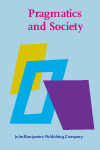
Pragmatics and Society
Scope & Guideline
Illuminating the Complexities of Communication in Society
Introduction
Aims and Scopes
- Interdisciplinary Pragmatics Research:
The journal emphasizes research that integrates insights from linguistics, sociology, anthropology, and communication studies to provide a holistic view of language use in society. - Contextual Analysis of Communication:
It explores how context influences language use, including the social, cultural, and situational factors that affect communicative behavior. - Focus on Identity and Power Dynamics:
There is a consistent focus on how language reflects and constructs identities and power relations within various societal frameworks. - Politeness and Social Norms:
Research often addresses the role of politeness strategies in communication, examining how social norms shape interaction patterns in different cultures. - Health Communication:
The journal features studies on health-related discourse, particularly how pragmatic approaches can improve communication in medical contexts. - Cultural Pragmatics:
It investigates how cultural factors influence pragmatic meanings and practices, contributing to the understanding of cross-cultural communication.
Trending and Emerging
- Digital Communication and Social Media:
There is a growing focus on how language is used in digital contexts, particularly on social media platforms, exploring issues like identity, politeness, and conflict in online interactions. - Health Discourse in Crisis Contexts:
Recent studies emphasize health communication during crises (e.g., COVID-19), examining how pragmatic strategies can enhance clarity and effectiveness in public health messaging. - Multimodal Communication:
Emerging research on multimodal interaction highlights the importance of visual and other non-verbal elements in communication, reflecting a broader understanding of how people convey meaning. - Cross-Cultural Pragmatics:
An increasing number of studies are dedicated to cross-cultural comparisons, investigating how different cultural backgrounds influence pragmatic norms and communication styles. - Identity Work in Discourse:
Research exploring identity construction through discourse is on the rise, particularly in contexts of migration, gender, and social media, indicating a heightened interest in the intersection of language and identity.
Declining or Waning
- Traditional Speech Act Theory:
There has been a noticeable decrease in papers strictly adhering to traditional speech act theory, suggesting a shift towards more contemporary frameworks that consider the complexities of interaction beyond mere speech acts. - Formal Linguistic Approaches:
Research employing highly formalized linguistic approaches appears to be less prevalent, as the journal increasingly favors studies that apply pragmatic analysis to real-world contexts. - Static Models of Communication:
The decline of static models that do not account for dynamic interactional contexts indicates a growing preference for approaches that emphasize the fluidity and adaptability of language in social interactions.
Similar Journals
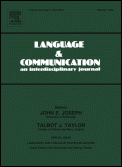
LANGUAGE & COMMUNICATION
Exploring the intersections of linguistics, psychology, and communication.LANGUAGE & COMMUNICATION is a prestigious journal published by PERGAMON-ELSEVIER SCIENCE LTD that serves as an essential resource for researchers and practitioners in the fields of communication, linguistics, and psychology. With a focus on interdisciplinary approaches, this journal has maintained a strong impact, as evidenced by its high rankings—Q1 status in communication and linguistics, and notable categories in experimental and cognitive psychology, as highlighted by the 2023 Scopus rankings. Established in 1981, LANGUAGE & COMMUNICATION combines rigorous empirical research with practical applications, making it a critical forum for advancing understanding in language use and communication theory. While currently not an Open Access journal, it offers vital insights to academics and professionals alike, facilitating knowledge dissemination and sparking meaningful dialogue within the community. Its commitment to excellence is further demonstrated by its contributions to key areas of study, positioning it as a vital publication for anyone invested in the exploration of language and human interaction.

Circulo de Linguistica Aplicada a la Comunicacion
Innovating Insights in Communication and LinguisticsCirculo de Linguistica Aplicada a la Comunicacion is a premier open-access journal published by UNIV COMPLUTENSE MADRID, SERVICIO PUBLICACIONES, since 2000, that serves as a vital resource for researchers, professionals, and students in the fields of linguistics and language studies. With an ISSN of 1576-4737, this journal is recognized for its rigorous scholarship and has achieved a notable Q1 quartile ranking in Linguistics and Language as of 2023. The journal's impact extends across diverse domains, holding significant positions in both the Arts and Humanities and Social Sciences categories, ranking #354/1088 and #419/1167 in Scopus, respectively. It features a rich array of research articles that delve into applied linguistics, communication theories, and language pedagogy, creating a comprehensive platform for academic discourse. By fostering collaboration and innovation in language research, Circulo de Linguistica Aplicada a la Comunicacion remains a crucial contributor to the enrichment of knowledge and understanding within the global linguistic community.
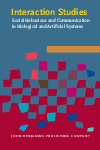
Interaction Studies
Pioneering Research in Communication DynamicsInteraction Studies is a premier journal published by JOHN BENJAMINS PUBLISHING CO, focusing on the dynamic intersections between language, communication, and technological interaction. Since its inception in 2004, the journal has established itself as a critical resource in the fields of Animal Science and Zoology, Communication, Human-Computer Interaction, and Linguistics and Language, achieving impressive rankings and quartile placements across multiple disciplines. The journal's commitment to interdisciplinary research is reflected in its Q1 status in Linguistics and Language and Q2 rankings in both Communication and Animal Science for 2023. Interaction Studies not only provides a platform for innovative research but also facilitates a deeper understanding of complex interactions in various contexts, making it an essential read for scholars, professionals, and students alike. The journal is based in the Netherlands and is accessible through traditional subscription models, with an extensive archive providing valuable insights into evolving scholarly discourses. With its robust impact and academic rigor, Interaction Studies is poised to remain a leading voice in the ongoing exploration of interactive phenomena.
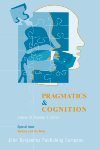
Pragmatics & Cognition
Exploring the Intersection of Language and MindPragmatics & Cognition, published by John Benjamins Publishing Co, is an esteemed journal that serves as a cross-disciplinary platform for the study of language, cognition, and context-dependent communication. With its ISSN 0929-0907 and E-ISSN 1569-9943, the journal has established a notable reputation since its inception in 1993, although its coverage spans various fields from behavioral neuroscience to linguistics and philosophy. Recognized for its scholarly contributions, it holds impressive Scopus rankings, significantly within Linguistics and Language, where it ranks in the 63rd percentile among peers. Although it currently maintains a Q4 designation in Behavioral Neuroscience and a Q1 in Linguistics and Language as of 2023, the journal appeals to a diverse audience addressing the intricate relationships between language use and cognitive processes. As researchers and academics navigate this evolving landscape, Pragmatics & Cognition remains pivotal in fostering essential dialogues and advancing knowledge in the interdisciplinary field, providing rich content that is both insightful and relevant.
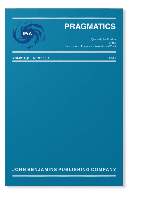
Pragmatics
Fostering innovative research in language and society.Pragmatics is a premier international journal dedicated to the exploration and development of the field of pragmatics, published by John Benjamins Publishing Co. This esteemed journal, with an ISSN of 1018-2101 and E-ISSN 2406-4238, offers a vital platform for interdisciplinary research in linguistics, philosophy, and social sciences, making significant contributions to scholarly discourse since its convergence in 2005. Recognized for its high-impact research, Pragmatics boasts a prestigious Q1 ranking in both Linguistics and Language and Philosophy as of 2023, with impressive Scopus rankings that place it in the top percentiles of its categories. The journal aims to enhance understanding of communication in diverse contexts and encourages submissions that reflect innovative theoretical perspectives and empirical findings. Although not an open-access journal, it is essential for researchers, professionals, and students seeking to stay at the forefront of pragmatic studies and related disciplines. With its base in Belgium and an address in Amsterdam, Pragmatics continues to influence global conversations in the humanities and social sciences.

Voprosy Yazykoznaniya
Advancing the Frontiers of Language ResearchVoprosy Yazykoznaniya, published by the esteemed Russian Academy of Sciences and the State Academy of Humanities (GAUGN), stands as a leading journal in the field of linguistics and language studies. With an impressive Q2 rank in Linguistics and Language for 2023 and a strong position within Scopus rankings, this journal fosters scholarly dialogue and pushes the boundaries of linguistic research by providing a platform for innovative studies, reviews, and analyses. Although not open access, its publication ensures high academic standards and visibility within the global academic community. Researchers, professionals, and students alike can benefit from the rich insights and diverse perspectives presented in this journal, serving as a vital resource for anyone interested in the intricacies of language and its role in society. Operating since 2009 and continuing to 2024, Voprosy Yazykoznaniya is an essential reference point for contemporary linguistic scholarship in the Russian Federation and beyond.

Revista de Investigacion Linguistica
Connecting scholars through the richness of linguistic inquiry.Revista de Investigacion Linguistica is a distinguished open-access journal dedicated to the exploration and advancement of linguistic research, published by the University of Murcia since its inception in 1997. With the ISSN 1139-1146 and E-ISSN 1989-4554, this journal serves as a vital resource for linguistics scholars and enthusiasts around the globe. Located in the vibrant city of Murcia, Spain, the journal aims to foster academic discourse by disseminating high-quality research that covers a broad spectrum of linguistic topics, including syntax, semantics, phonetics, and sociolinguistics. Its commitment to open access ensures that knowledge is freely available, promoting a wider reach and impact in the academic community. By contributing to the advancement of linguistic studies, the Revista de Investigacion Linguistica plays a crucial role in shaping contemporary linguistic theories and practices, making it an essential publication for researchers, professionals, and students alike.

Anuari de Filologia-Estudis de Linguistica
Fostering collaboration in the study of language.Anuari de Filologia-Estudis de Lingüística is a prominent open-access journal published by the University of Barcelona, dedicated to advancing the study of linguistics and philology. Since its establishment, the journal has become a vital platform for scholars and researchers interested in the intricate dynamics of language, embracing various linguistic fields and methodologies. With its Open Access model initiated in 2011, Anuari de Filologia ensures that cutting-edge research is accessible to a global audience, bridging gaps in knowledge and fostering collaboration. The journal’s commitment to excellence is reflected in its rigorous peer-review process and engagement with contemporary linguistic issues. This makes it an essential resource for academics, professionals, and students aiming to deepen their understanding of linguistic theories and practices in an increasingly interconnected world.
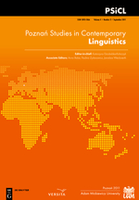
Poznan Studies in Contemporary Linguistics
Exploring the forefront of linguistic innovation.Poznan Studies in Contemporary Linguistics, published by DE GRUYTER MOUTON, is a pivotal journal in the field of linguistics, with an ISSN of 0137-2459 and an E-ISSN of 1897-7499. Located in Germany, this esteemed journal has consistently contributed to the academic landscape since its inception. As of 2023, it holds a Q2 category rank in Linguistics and Language and boasts commendable Scopus rankings, featuring in the 69th percentile for Arts and Humanities and the 66th percentile for Social Sciences. The journal emerges as a vital platform for scholars to explore contemporary linguistic theories and practices, making it an essential resource for researchers, professionals, and students alike. With a converged publication period from 2007 to 2024, it aims to facilitate a deeper understanding of linguistic advancements and trends. While the journal currently does not offer open access, its rigorous peer-review process ensures the highest quality of published research, strengthening its role as a leading discourse in the dynamic field of linguistics.
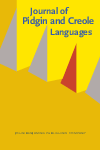
JOURNAL OF PIDGIN AND CREOLE LANGUAGES
Diving Deep into the World of Language DiversityJOURNAL OF PIDGIN AND CREOLE LANGUAGES, published by John Benjamins Publishing Co, is a leading international journal dedicated to the study of pidgin and creole languages, offering a unique platform for interdisciplinary research within the fields of linguistics and language studies. With an impressive impact factor reflected in its 2023 Scopus rankings—placing it in the Q2 category for both Linguistics and Language—this journal has established itself as an essential resource for academics and practitioners alike. Covering a broad temporal scope from 1986 to 2024, it promotes innovative research that advances the understanding of language evolution, socio-linguistics, and cultural dynamics. The journal’s focus on both theoretical and practical perspectives makes it particularly valuable for researchers, professionals, and students interested in the complexities of language and identity. Although it does not currently offer Open Access, its commitment to quality scholarship ensures that each issue presents cutting-edge research and critical insights into the world of pidgins and creoles.